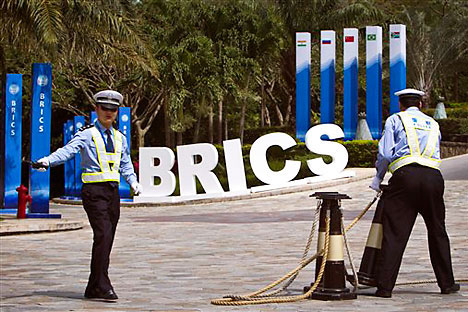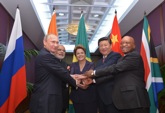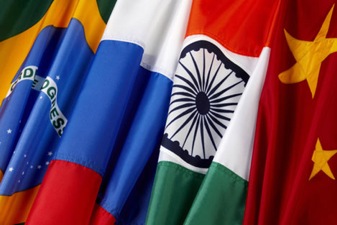BRICS moving toward the Islamic world

Several Islamic majority countries are also positively looking to become members of BRICS, among them Turkey, Nigeria, Egypt, and Iran. Source: AP
In January this year, Russia assumed the presidency of BRICS – Brazil, Russia, India, China, South Africa – a group of nations that holds great promise. Together they occupy over a third of the earth's surface, house 42% of the world’s population, and account for 15% of global trade.
Defining the priorities of the Russian presidency, President Vladimir Putin said Moscow would continue to work to strengthen the organization and attempt to enrich its practical work with new ideas.
For BRICS, a major challenge particularly will be how to focus on building cooperation with the increasingly stormy outlook for developing Islamic states.
BRICS have enormous economic and political potential and, significantly, share a goal to change the existing world order at all levels, from instruments of the global financial and economic system to vital security issues. BRICS countries favour multi-polarity and view the hegemony of one country and its allies as misguided and dangerous in the modern world.
Mutually beneficial cooperation and constructive dialogue, taking into account interests of all parties, should be the natural and productive path in all international relations. Moscow is promoting an approach aimed at harmonization of interests among existing BRICS members, and one able to provide for the further expansion of the group. Apparently, this expansion may not be too far in the future.
Experts note that the inter-civilizational format of BRICS would be incomplete without the participation of Islamic countries. It is thus not by chance that one of the most likely candidates for accession to BRICS is Indonesia, the world’s largest Muslim country population-wise. Indonesia is recognized as one of the leaders of the developing world, in terms of current economic development and future growth.
According to Alexander Abramov, professor at the Higher School of Economics,“Today, all BRICS countries are increasing their interactions with countries of the Islamic world. In this connection, I would name Egypt, Iran, Turkey, Indonesia and, to a certain extent, Pakistan. The trade turnover with these countries is growing rapidly, and new joint projects are appearing. One such example is the construction of the Southern Transport Corridor.”
“With the BRICS acting as a consolidating association, this cooperation can be greatly expanded, and new directions identified, including in the political and financial spheres. For example, there is the establishment of the Development Bank, in which a country like Iran can participate,” Abramov said.
Sergey Markedonov, Associate Professor in the Department of Foreign Studies and Foreign Policy at RSUH believes that the Islamic factor now plays a significant role in the BRICS countries.
“In all these countries, Muslims do not form a majority of the population, but there are many with considerable Islamic communities,” Markedonov said. “This is especially true of India, China, and parts of Russia. These are important issues. Today the BRICS countries are uniting – as are other countries unhappy with the unilateral hegemony of the United States – against the unipolar world. This American policy must be replaced by the idea of multilateral cooperation, and the practical integration with the Islamic world cannot be left out of this process,” he said.
Several Islamic majority countries are also positively looking to become members of BRICS, among them Turkey, Nigeria, Egypt, and Iran. This trend would allow for the creation of an association of states which could become the embodiment of a new concept of international relations; one based on balanced partnerships - West, East and South - as well as a more equitable distribution of global governance mechanisms than is the case today,.
This is in addition to the much-needed humanitarian dialogue which needs to be conducted globally. The absence of such a dialogue today is what has led to the creation of breeding grounds for numerous conflicts.
First published in Russian by RIA Novosti.
All rights reserved by Rossiyskaya Gazeta.
Subscribe
to our newsletter!
Get the week's best stories straight to your inbox

